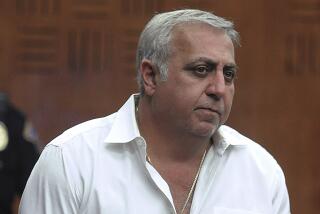Atty. Gen. Denies Appearance of Conflict of Interest : Levin Assails Meese on Wedtech Probe
- Share via
WASHINGTON — Atty. Gen. Edwin Meese III gave the appearance of a conflict of interest by failing to remove himself sooner from a Justice Department investigation of Wedtech Corp. after investing $54,500 with an investment adviser linked to the scandal-plagued company, the chairman of a Senate investigating panel charged Thursday.
Sen. Carl Levin (D-Mich.), chairman of the Senate Governmental Affairs oversight subcommittee, contrasted Meese’s actions with a pledge made by the attorney general during his 1985 Senate confirmation hearings to “go overboard to avoid any appearance that might be construed, misconstrued, or misinterpreted or even distorted.”
Charge Rejected
Meese, testifying on financial disclosures he made about the controversial investment, rejected the conflict-of-interest charge, saying his actions “would not create an appearance problem to any fair-minded person.”
The attorney general removed himself from all Wedtech matters in April after learning that W. Franklyn Chinn, his investment adviser, was a possible subject of a federal criminal investigation of Wedtech. He subsequently withdrew his investment with Chinn, which was made in 1985.
But the criminal investigation of Wedtech, a defense contractor, and some of its officers for allegedly bribing public officials to help win no-bid government contracts began last year, well before Meese removed himself from the case.
“Why, as attorney general of the United States, given your intervention on behalf of the company, your partnership with Mr. Chinn, why didn’t you disqualify yourself last year . . . when your agency was investigating the top officers of the company?” Levin asked.
‘Political Purposes’
Meese contended that he was following Justice Department policy by removing himself as soon as he learned that Chinn had become a possible subject of the probe. Outside the hearing, Meese accused Levin of distorting the facts “for partisan political purposes.”
The hearing, called to examine disclosures Meese had made about his investment with Chinn and the handling of the information by the federal Office of Government Ethics, disclosed some new information about Meese’s relationship with the company.
Under questioning by Levin, Meese told of an intense lobbying campaign on Wedtech’s behalf by his longtime friend and attorney, E. Robert Wallach. He said Wallach, who received more than $1 million in legal fees and stock from Wedtech, had written him an estimated 12 memos about the firm’s efforts to win no-bid Pentagon contracts set aside for minority-owned firms.
This was twice as many as Meese had estimated previously. In addition, Meese acknowledged that the memos, sent to him when he was counselor to President Reagan, were sent to his home as well as his office.
‘Fair Hearing’
The attorney general said he did not recall whether he had suggested to Wallach that the memos be sent to his home. But he noted that his White House office intervened to get the company what Meese called “a fair hearing” and arranged a meeting with Pentagon officials, after which Wedtech was awarded an Army engine contract.
Wallach, who is also a possible subject of the federal investigation of Wedtech, which is being conducted by U.S. Atty. Rudolph W. Giuliani in New York, introduced Chinn to Wedtech officials and recommended that Meese invest funds with Chinn.
Earlier at the hearing, David Martin, director of the Office of Government Ethics, said Meese still has not fully complied with ethics laws by his disclosure Monday that his investment with Chinn resulted in gross profit exceeding $39,000 through 23 highly speculative stock trades.
Martin said Meese must amend his financial disclosure statements to include the information and provide additional details.
But Republican defenders of Meese, led by Sen. Ted Stevens of Alaska, accused Martin of “abusing” the attorney general by failing to ask him for additional financial details about his Chinn investment instead of advising a Democratic congressman who made the omissions public.






